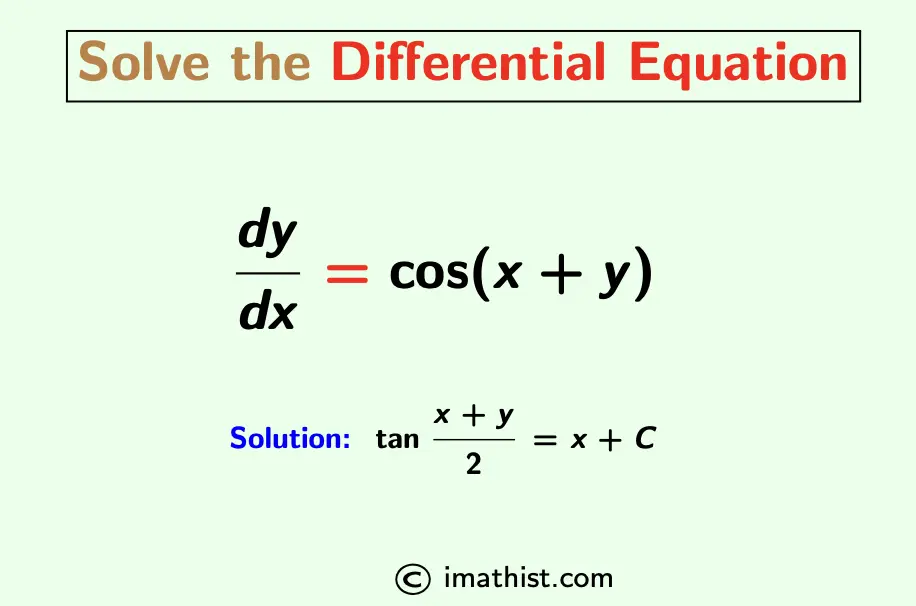The general solution of the differential equation dy/dx=cos(x+y) is equal to tan(x+y)/2 = x+C. Here we learn how to solve dy/dx=cos(x+y).

Find General Solution of dy/dx=cos(x+y)
Question: What is the solution of dy/dx=cos(x+y)?
| Answer: The solution of dy/dx=cos(x+y) is tan(x+y)/2 = x+C. |
Solution:
Let x+y=2u
So 1+ $\dfrac{dy}{dx}$ = 2 $\dfrac{du}{dx}$
⇒ $\dfrac{dy}{dx}$ = 2 $\dfrac{du}{dx}$ -1.
Thus, the given equation dy/dx=cos(x+y) becomes
2 $\dfrac{du}{dx}$ -1 = cos 2u
⇒ 2 $\dfrac{du}{dx}$ = 1+ cos 2u
⇒ 2 $\dfrac{du}{dx}$ = 2cos2u, by the formula 1+ cos 2x = 2cos2x
⇒ $\dfrac{du}{dx}$ = cos2u
⇒ sec2u du = dx
Integrating, ∫sec2u du = ∫dx +C
⇒ tan u = x+C
⇒ tan $\dfrac{x+y}{2}$ = x+C as 2u=x+y.
So the solution of dy/dx=cos(x+y) is tan $\dfrac{x+y}{2}$ = x+C where C is a constant.
ALSO READ:
Alternative Method:
Let z=x+y.
Differentiating with respect to x, we get that
$\dfrac{dz}{dx}=1+\dfrac{dy}{dx}$
⇒ $\dfrac{dy}{dx}=\dfrac{dz}{dx}-1$
Substituting the above values in the given differential equation dy/dx = cos(x+y), we obtain that
$\dfrac{dz}{dx}$ -1 = cos z
⇒ dz/dx = 1+cos z
Rewriting, $\dfrac{dz}{1+\cos z}=dx$
Thus, ∫ $\dfrac{dz}{1+\cos z}$ = ∫dx +C
Multiplying the numerator and the denominator by 1-cos z, we have that
∫ $\dfrac{1-\cos z}{(1+\cos z)(1-\cos z)} dz$ = ∫dx +C
⇒ ∫ $\dfrac{1-\cos z}{1-\cos^2 z} dz$ = ∫dx +C
⇒ ∫ $\dfrac{1-\cos z}{\sin^2 z} dz$ = ∫dx +C [using the formula cos2z +sin2z=1]
⇒ ∫ $\dfrac{1}{\sin^2 z} dz$ – ∫ $\dfrac{\cos z}{\sin^2 z} dz$ = ∫dx +C
⇒ ∫ cosec2z dz – ∫cosecz cotz dz = ∫dx +C
⇒ – cot z + cosec z = x +C as the integral of cosec2x is -cotx and the integral of cosecs cote is -cosecx.
⇒ -cot(x+y) + cosec(x+y) = x +C as z=x+y.
So the solution of dy/dx=cos(x+y) is equal to cosec(x+y) -cot(x+y)= x +C where C is an integral constant.
FAQs
What is the general solution of dy/dx=cos(x+y)?
Answer: The general solution of dy/dx=cos(x+y) is tan(x+y)/2 = x+C, where C denotes an integration constant.